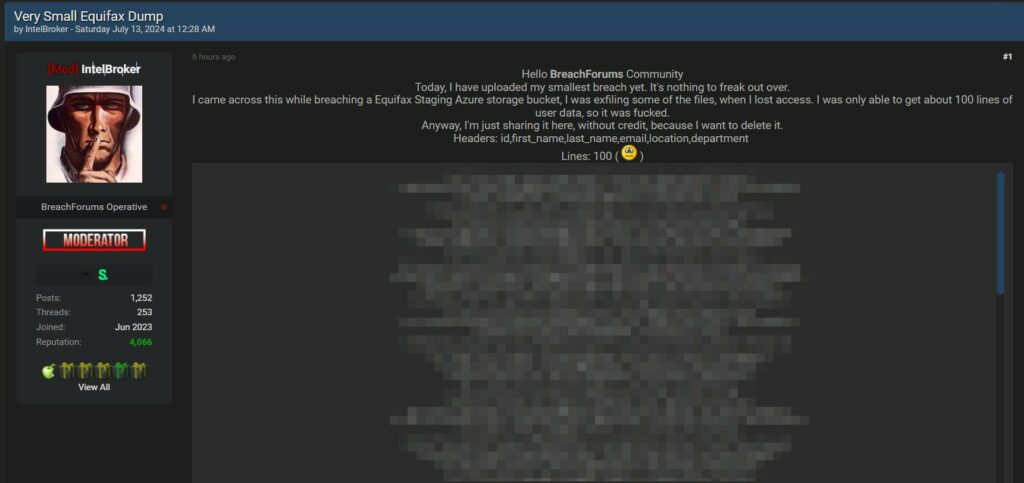
Recently, a threat actor in an underground forum published an alleged data breach. This incident was revealed by a user named IntelBroker on BreachForums, a notorious online community for cybercriminal activities. According to IntelBroker, the data was obtained from an Equifax Staging Azure storage bucket.
Currently, we are unable to accurately confirm the veracity of the breach, as no press release has been issued on the official website regarding the incident. Therefore, this article should be used as an “intelligence source.”

According to the post by IntelBroker, the breach involved the exfiltration of some files from an Equifax Staging Azure storage bucket. The threat actor claims to have lost access while exfiltrating data and managed to extract only about 100 lines of user data. The data purportedly includes the following headers: ID, first name, last name, email, location, and department. The post includes a partially redacted list of these entries, emphasizing the limited scope of the breach.
Equifax, a global data analytics and technology company, is one of the largest credit reporting agencies in the world. With operations in numerous countries and a workforce of thousands, Equifax manages vast amounts of sensitive financial data. The company plays a crucial role in providing credit scores and reports, which are integral to various financial transactions and decisions.
The objective of threat actors targeting such an organization is often to steal valuable personal and financial information. This data can be sold on underground markets or used for identity theft, financial fraud, and other malicious activities. The breach of an Equifax storage bucket, even if small in scale as claimed, highlights the continuous efforts of cybercriminals to exploit vulnerabilities in major corporations.
The release of personal information, even in a limited quantity, poses significant risks. The data shared by IntelBroker includes identifiable information such as names, emails, and locations. Such information can be used to carry out phishing attacks, identity theft, and other forms of cybercrime. Furthermore, the exposure of departmental affiliations could potentially provide additional context for social engineering attacks aimed at Equifax employees or associates.
This incident underscores the importance of robust security measures and constant vigilance in protecting sensitive data. Organizations like Equifax, which handle critical financial information, must ensure that their storage systems are adequately safeguarded against unauthorized access.
In 2017, Equifax was at the center of one of the largest and most devastating cyberattacks in history. The incident, which affected about 147 million people, was caused by a vulnerability in the Apache Struts2 framework used by the company for some of its web applications. This bug, known as CVE-2017-5638, was a remote code execution vulnerability that allowed attackers to send malicious commands to Equifax’s web server, thus gaining unauthorized access to sensitive data.
The actors behind this massive attack have never been definitively identified, but the data theft revealed the depth of information held by Equifax, including personal information such as names, social security numbers, birth dates, addresses, and in some cases, driver’s license numbers. The breach also exposed credit card numbers of about 209,000 consumers.
This attack was possible because Equifax did not promptly apply the security patch released to fix the Struts2 vulnerability. Despite Apache having released the patch two months before the attack, Equifax delayed implementing it, thereby leaving their systems vulnerable.
The attack had significant consequences not only for the affected individuals but also for Equifax itself. The company faced numerous lawsuits, a loss of consumer trust, and a thorough review of its security practices. Furthermore, the incident raised important questions about the protection of personal data and the responsibility of companies that manage sensitive information on a large scale.
The 2017 case thus highlighted how crucial it is for companies to adopt rigorous vulnerability management and timely system updates, especially when it comes to defending such critical and sensitive data.
While the alleged Equifax data breach reported by IntelBroker on BreachForums remains unconfirmed, it serves as a stark reminder of the persistent threats faced by organizations managing sensitive information.
As is our custom, we always leave room for a statement from the company should they wish to provide us with updates on the matter. We would be happy to publish such information with a specific article highlighting the issue.
RHC Dark Lab will monitor the evolution of the situation in order to publish further news on the blog, should there be substantial updates. If there are individuals with knowledge of the facts who wish to provide information anonymously, they can use the whistleblower’s encrypted email.
This article has been compiled based on public information that has not yet been verified by the respective organizations. We will update our readers as more details become available.
Follow us on Google News to receive daily updates on cybersecurity. Contact us if you would like to report news, insights or content for publication.
